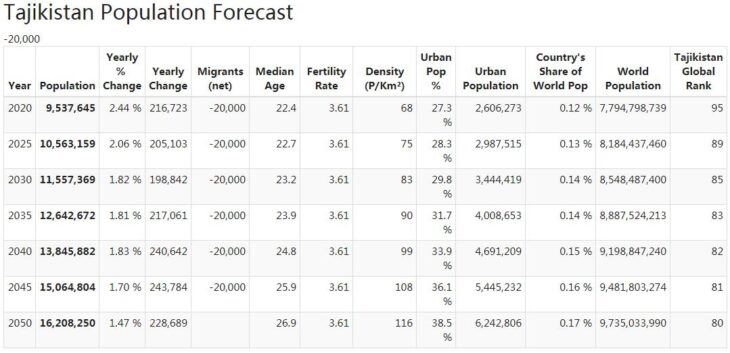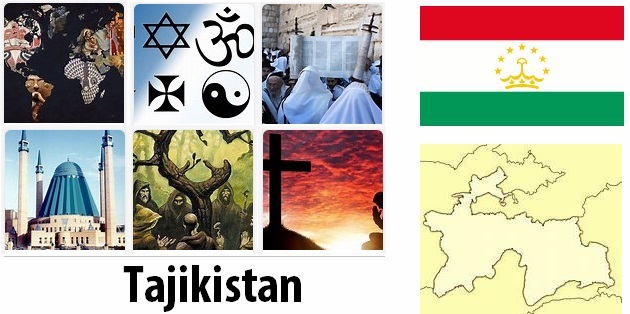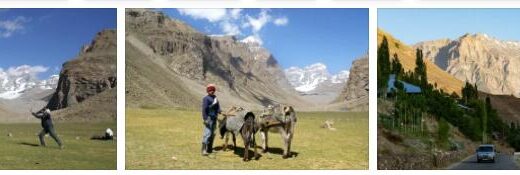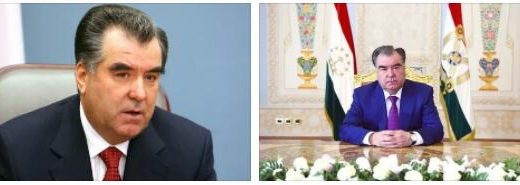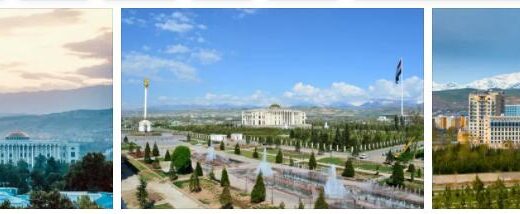Tajikistan Religion
Islam is the dominant religion in Tajikistan. Most residents confess to Islam’s main direction Sunni. In Pamir, in the south-east, there is a smaller group of Shiite Muslim Ismailites (the “seven sect”). There are severe restrictions on religious freedom.
There is no official religion, but the state recognizes a special status for Hanafi, the largest of the Sunni Islam law schools. The government emphasizes that Tajikistan is a secular state, but it is considered more a mark against religious extremism than against religion.
During the Soviet era (1920–1991), the state engaged in atheistic propaganda. After independence, interest in religion grew and Islam took on a greater role in public life. During the 2000s, the authorities have become increasingly concerned about religious radicalization, which also strikes against peaceful religious practitioners. The constitutional freedom of religion has been increasingly circumvented by a new law that was adopted in 2009 and has subsequently been further tightened.
According to the law, religious groups must register with the authorities. Religious activities that are not registered can result in fines or imprisonment. This also applies to private religious teaching and missionary work. The number of mosques that may be present and their size is strictly regulated and the authorities have views on who may become an imam or other religious leader. The state controls the content and possible import of religious literature. Minors are not entitled to participate publicly in religious activities.
The law explicitly prohibits Salafism, a literal form of Sunni Islam. The Salafists in Tajikistan are largely young people who studied in Koran schools in Arab countries. Particular concern among the authorities raises the Hizb ut-Tahrir group (see Political system).
Many Islamists have been arrested in the 2000s and 2010s, and hundreds have been sentenced to long prison terms. The authorities have also banned several Christian groups, including Jehovah’s Witnesses.
Even among the population there is a widespread fear of Islamism, while Islam’s influence in society has increased since independence. Countries like Iran and Saudi Arabia, for example, have invested a lot of money in building mosques and Quran schools in the country. Nowadays, Tajikistan also has its own spiritual leader, mufti.
In the country there are also small groups of Orthodox Christians, Protestant Christians and Jews.
- Countryaah: Population statistics for 2020 and next 30 years in Tajikistan, covering demographics, population graphs, and official data for growth rates, population density, and death rates.
2016
November
Prison for insulting the president
November 8
Adopts a law punishing public offenses by the president with up to five years in prison; The law is worded to apply to current President Rahmon personally, and not the presidential office as such.
October
Hard punishment for lawyers
October 6
Two lawyers linked to the banned Islamic renewal party are sentenced to long prison terms. Buzurghmer Jorov, who has represented several members of the Islamist party, is sentenced to 23 years. Nuriddin Machamov, who would defend Yorov, is sentenced to 21 years.
August
170 jailed for coup attempt
August 4th
The state prosecutor announces that 170 men have been sentenced to prison for between 1 and 30 years for, among other things, murder and membership in a criminal movement. The charges relate to an alleged attempt to force President Rahmon by force (see September 2015).
June
Hard punishment for moderate Islamists
June 2
The Supreme Court sentenced two of the leaders of the banned Islamic renewal party to life imprisonment and eleven other members to prison for between 14 and 28 years. They are accused of being behind a coup attempt in 2015. Human rights organizations describe the trial as highly politicized and intended to silence the only group that has so far conducted any organized opposition to the increasingly powerful regime.
May
The president’s daughter becomes a senator
May 29th
President Rahmon’s daughter Ozoda Rahmon is elected to the Senate. Since January she has been her father’s chief of staff.
Voters strengthen the president’s power
May 22
As expected, voters in a referendum approve the proposed constitutional changes by a large majority. According to the Election Commission, 94.5 percent say yes to, among other things, having the president run for re-election for the rest of his life. The turnout is said to have been 92 percent. The voters decide on a total of 41 amendments to the constitution. The most important amendments are that the current President Rahmon may be re-elected indefinitely, that the minimum age to be elected President be lowered from 35 to 30 years (Rahmon’s son Rustam is 28) and that political parties may not be based on religious grounds. Voters must say yes or no to the whole package.
The President celebrates himself
15th of May
President Rahmon signs a law that makes November 15 a public holiday, President’s Day, designed to pay tribute to his “great efforts for peace and national cohesion.” The new weekend is part of the process of building a cult of personality around the president and his family.
April
Prohibition of Russian-sounding surnames on newborns
April 29
The government prohibits parents from giving their newborn children Russian-sounding surnames.
February
Referendum in May
February 10
Unanimously decides that the referendum on rule changes for the presidential office (see January 2016) should be carried out on 22 May; Residents are also expected to take a position on a proposal that political parties should not be based on religious or nationalist principles.
Islamists in court
February 9
Thirteen members of the Prohibited Islamic Renewal Party are facing trial for closed doors. They are charged with lying behind the unrest that cost dozens of people’s lives in September 2015.
January
The president’s daughter gets top job
January 27
President Rahmon appoints his 38-year-old daughter Ozoda Rahmon as its Chief of Staff. She has most recently been Deputy Foreign Minister. Her husband is the deputy chairman of the central bank and the president’s eldest son Rustam is the head of the anti-corruption authority.
Tajikistan can have a family dynasty
January 22
Parliament approves an addition to the constitution that gives President Emomali Rahmon the right to run for re-election as many times as possible; At the same time, the age is lowered when someone can be elected president from 35 years to 30. This means that the president’s eldest son Rustam Emomali could stand in the 2020 election, when he is 33. The fundamental change must be signed by the president and approved in a referendum to enter into force.
